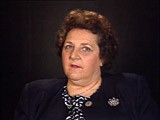You searched for: ���������������������������������������������fuk7778���your
<< Previous | Displaying results 1-25 of 163 for "���������������������������������������������fuk7778���your" | Next >>
-
“Give Me Your Children”: Voices from the Lodz Ghetto
ArticleThe Jewish children of Lodz suffered harsh conditions after the German invasion of Poland. Read excerpts from diaries where they recorded their experiences.
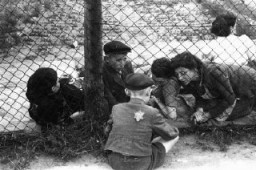
-
World War II Liberation Photography: Learning about Photographs You May Have in your Home
ArticleMany extremely graphic photographs taken at the time of liberation document crimes of the Nazi era. Learn about some of the most commonly reproduced photos.
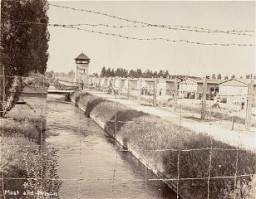
-
Your Kitten is Hungry
SongMordecai Gebirtig, born in 1877 in Krakow, Poland, was a Yiddish folk poet and songwriter. Gebirtig had three daughters, for whom he wrote and performed his poems. The words were set to improvised melodies, and most of his songs resemble entries in a diary. Many of Gebirtig's poems contain themes of eastern European Jewish life in the 1920s and 1930s. The lullaby "Your Kitten is Hungry" dates from the early 1920s. The lyrics, addressed to a hungry child, evoke the themes of hunger and deprivation.
-
American propaganda announcement
DocumentAnnouncement dropped by American planes on Shanghai near the end of the war. [From the USHMM special exhibition Flight and Rescue.]
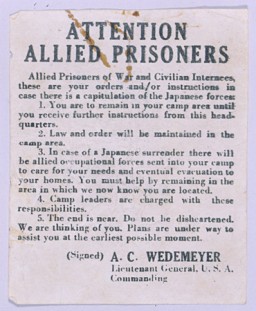
-
On the waiting list for American visas
DocumentThis document from the American Consul-General in Vienna certifies that the Trost family applied for American visas on September 15, 1938. It states that the family (Josef, Alice, Dorrit, and Erika) were placed on the waiting list for visas with the numbers 47291-47294.
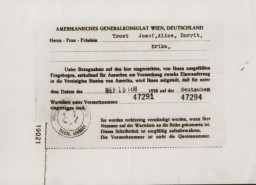
-
Doriane Kurz describes food rations and conditions in Bergen-Belsen
Oral HistoryDoriane's Jewish family fled to Amsterdam in 1940, a year that also saw the German occupation of the Netherlands. Her father perished after deportation to Auschwitz. After their mother was seized, Doriane and her brother hid with gentiles. The three were reunited at Bergen-Belsen, where they were deported via Westerbork. They were liberated during the camp's 1945 evacuation. Doriane's mother died of cancer soon after Doriane helped her recover from typhus. Doriane and her brother immigrated to the United…
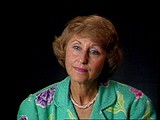
-
Erika Eckstut
ArticleExplore Erika Eckstut's biography and learn about the difficulties and dangers she faced in the Czernowitz ghetto.
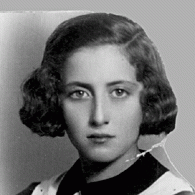
-
A notice sent by the American Consulate General in Berlin regarding immigration visas
DocumentA notice sent by the American Consulate General in Berlin to Arthur Lewy and family, instructing them to report to the consulate on July 26, 1939, with all the required documents, in order to receive their American visas. German Jews attempting to immigrate to the United States in the late 1930s faced overwhelming bureaucratic hurdles. It was difficult to get the necessary papers to leave Germany, and US immigration visas were difficult to obtain. The process could take years.
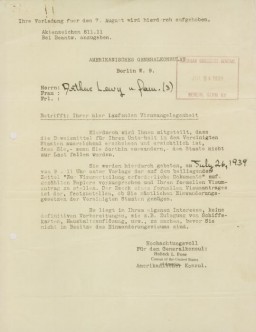
-
Wöbbelin
ArticleThe US 8th Infantry and the 82nd Airborne Divisions arrived at the Wöbbelin camp in May 1945, witnessing the deplorable living conditions in this subcamp of the Neuengamme concentration camp.
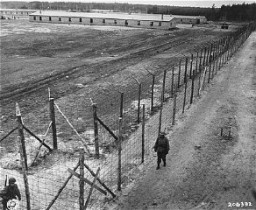
-
Lilly Appelbaum Malnik describes the process of registration in Auschwitz
Oral HistoryGermany invaded Belgium in May 1940. After the Germans seized her mother, sister, and brother, Lilly went into hiding. With the help of friends and family, Lilly hid her Jewish identity for two years. But, in 1944, Lilly was denounced by some Belgians and deported to Auschwitz-Birkenau via the Mechelen camp. After a death march from Auschwitz, Lilly was liberated at Bergen-Belsen by British forces.
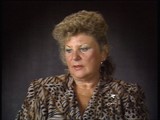
-
Father Charles Coughlin opposes Roosevelt
FilmFather Charles E. Coughlin was a Catholic priest who reached a large audience through mass rallies and radio broadcasts. Coughlin, openly antisemitic, was an outspoken critic of the political establishment. This footage shows him addressing more than 80,000 people, the Illinois members of the National Union for Social Justice, at Riverview Park in Chicago. He criticized President Roosevelt (running for a second term as President of the United States) and attacked the government's fiscal policy in the…
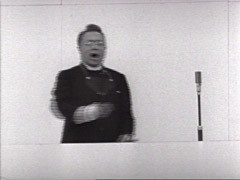
-
Jacob Wiener
ArticleExplore Jacob Wiener’s biography and learn about his experiences during Kristallnacht in Würzburg, Germany.
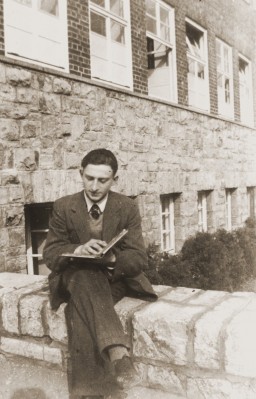
-
Verdict announced in Medical Case
FilmThe Medical Case was one of twelve war crimes trials held before an American tribunal as part of the Subsequent Nuremberg Proceedings. The trial dealt with doctors and nurses who had participated in the killing of physically and mentally impaired Germans and who had performed medical experiments on people imprisoned in concentration camps. Sixteen of the defendants were found guilty. Of the sixteen, seven were sentenced to death for planning and carrying out experiments on human beings against their will.…
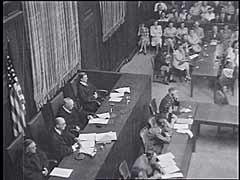
-
Bella Jakubowicz Tovey describes a meeting between her father and the Jewish council leader in Sosnowiec
Oral HistoryBella was the oldest of four children born to a Jewish family in Sosnowiec. Her father owned a knitting factory. After the Germans invaded Poland in 1939, they took over the factory. The family's furniture was given to a German woman. Bella was forced to work in a factory in the Sosnowiec ghetto in 1941. At the end of 1942 the family was deported to the Bedzin ghetto. Bella was deported to the Graeben subcamp of Gross-Rosen in 1943 and to Bergen-Belsen in 1944. She was liberated in April 1945.
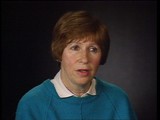
-
Norbert Wollheim describes forced labor at the Buna works
Oral HistoryNorbert studied law and was a social worker in Berlin. He worked on the Kindertransport (Children's Transport) program, arranging to send Jewish children from Europe to Great Britain. His parents, who also lived in Berlin, were deported in December 1942. Norbert, his wife, and their child were deported to Auschwitz in March 1943. He was separated from his wife and child, and sent to the Buna works near Auschwitz III (Monowitz) for forced labor. Norbert survived the Auschwitz camp, and was liberated by US…
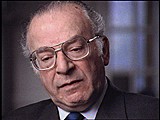
-
Magdalena Kusserow's letter to her sister
DocumentMagdalena Kusserow, incarcerated in a special barracks for Jehovah's Witnesses in the Ravensbrück concentration camp, used stationery provided to prisoners to write a letter to her sister Annemarie in April 1942. The handwritten numbers in the block in the upper right identify Magdalena as prisoner 9591, assigned to block 17a. Magdalena wrote to her sister in part (translated from German): "Dear Annemarie. Received your letter of March 15, did you get mine? I'm fine. How did it go with Wolfgang's 2nd…
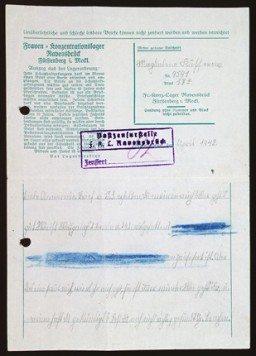
-
Aron (Dereczynski) Derman describes deportations from the Grodno ghetto in November 1942
Oral HistoryAron was born to a middle-class Jewish family in Slonim, a part of Poland between the two world wars. His parents owned a clothing store. After studying in a technical school, Aron worked as a motion-picture projectionist in a small town near Slonim. The Soviet army took over Slonim in September 1939. War broke out between Germany and the Soviet Union in June 1941. Aron returned to Slonim. The Germans soon occupied Slonim, and later forced the Jews into a ghetto. Aron was forced to work in an armaments…
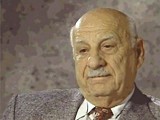
-
Miso (Michael) Vogel describes arrival at Auschwitz
Oral HistoryIn 1939, Slovak fascists took over Topol'cany, where Miso lived. In 1942, Miso was deported to the Slovak-run Novaky camp and then to Auschwitz. At Auschwitz, he was tattooed with the number 65,316, indicating that 65,315 prisoners preceded him in that series of numbering. He was forced to labor in the Buna works and then in the Birkenau "Kanada" detachment, unloading incoming trains. In late 1944, prisoners were transferred to camps in Germany. Miso escaped during a death march from Landsberg and was…
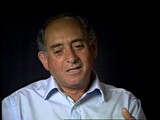
-
Wallace Witkowski describes harsh living conditions for non-Jews in Poland
Oral HistoryWallace and his family were Polish Catholics. His father was a chemical engineer and his mother a teacher. The Germans occupied Kielce in 1939. Wallace witnessed pogroms against Jews in 1942. Wallace was active in the anti-Nazi resistance, acting as a courier between partisan groups. In 1946, in liberated Poland, Wallace witnessed the Kielce pogrom. He was reunited with his father in the United States in 1949; other family members followed. The Communist regime in Poland, however, denied his only sister…
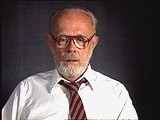
-
Joseph Stanley Wardzala describes forced labor in Hannover
Oral HistoryJoseph and his family were Roman Catholics. After Germany invaded Poland in 1939, roundups of Poles for forced labor in Germany began. Joseph escaped arrest twice but the third time, in 1941, he was deported to a forced-labor camp in Hannover, Germany. For over four years he was forced to work on the construction of concrete air raid shelters. Upon liberation by US forces in 1945, the forced-labor camp was transformed into a displaced persons camp. Joseph stayed there until he got a visa to enter the…
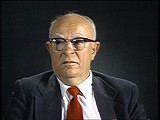
-
Leo Kutner describes forced labor in Stutthof
Oral HistoryLeo was arrested on the first day of the war, and assigned to forced labor in a shipyard, then on a farm. In 1940, like other Jews, he was deported to Stutthof. There, he upholstered furniture for the SS. The following year, he was sent to Auschwitz, where he cleaned the streets and dug ditches. As the Allies neared, Leo was evacuated to a series of camps. On a death march from Flossenbürg, the Nazis dispersed, allowing Leo and other prisoners to get away. He was liberated by US forces in April 1945.
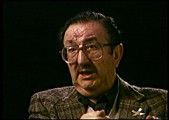
-
Leo Bretholz describes arrival at the Drancy camp
Oral HistoryAfter the Germans annexed Austria in 1938, Leo attempted to flee. He eventually reached Belgium. In 1940 he was deported to the St.-Cyprien camp in France but escaped. In 1942 Leo was smuggled into Switzerland but was arrested and sent back to France, this time to the Rivesaltes and Drancy camps. He and a friend escaped from a train deporting them to Auschwitz in Poland. Leo joined the French underground in 1943. He arrived in the United States in 1947.
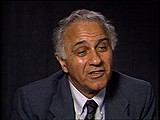
-
Beno Helmer describes conditions in the Lodz ghetto
Oral HistoryAs a young man, Beno used his foreign language skills to land small movie roles. He and his family were deported to the Lodz ghetto, where they struggled daily to find food. In the underground, Beno became an expert at derailing trains. The family was sent to Auschwitz and was separated. All but Beno and one sister, whom he found after the war, died. Beno survived a series of camps and later helped to track war criminals.
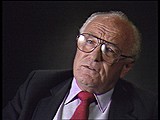
-
An Overview of the Holocaust: Topics to Teach
ArticleRecommended resources, topics, context, rationale, and critical thinking questions if you have limited time to teach about the Holocaust.
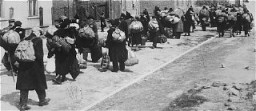
-
Hetty d'Ancona Deleeuwe describes difficulties of going into hiding
Oral HistoryThe Germans invaded the Netherlands in May 1940. After a year or so, Hetty and other Jewish children could no longer attend regular schools. The Germans took over her father's business in 1942. Hetty's father tried to prove that the family was Sephardic, and they were thus exempted from a roundup in 1943. Hetty's father decided that the family should leave Amsterdam, and Hetty was hidden with a family in the southern Netherlands. She and both her parents survived.
